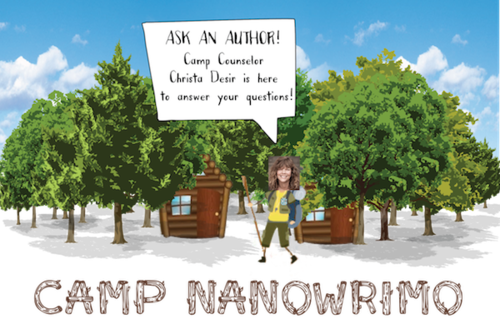Ask An Author: "How do you write good issue scenes without making them exploitative?"

Each week, a new author will serve as your Camp Counselor, answering your writing questions. Christa Desir, our first counselor, writes contemporary fiction for young adults, and has volunteered as a rape victim activist for more than ten years. Her second book , Bleed Like Me , will be out this fall.
How do you write good issue scenes without making them exploitative? — Anonymous
So for me, the foundation of my issue books has always been testimony. I listen to people’s stories. I think any good writer is a good listener and a collector of stories. When it comes to tackling difficult issues so that they aren’t cliché or “after school special,” I start by reading or talking to people who have been through those issues. Then I think about what I want to say about these things. Not in terms of a “message,” but more in terms of what questions do I want to ask readers to think about.
I don’t believe fiction should be prescriptive. I don’t think it should be an alternative to therapy. And while I do know many people who have said certain books have “helped,” I think it is because those books asked the reader a question about themselves that made the reader understand something. It wasn’t the book that fed the answer to the reader, it was the question that sparked something.
Discussion of sexual assault under the cut.
The other thing I think about when taking on difficult issues is what else has been said. For example, in the case of my book Fault Line, which deals with sexual assault, I did not want to write another Speak, the amazing book by Laurie Halse Anderson. I think Speak is a beautiful book that tackles rape in a very important and thoughtful way.
I wanted to look at the people beyond the survivor who were impacted by sexual violence. In particular, the boyfriend of the survivor who wasn’t at the party when she was gang raped. I wanted to ask a question about what it’s like for those who are involved with survivors. And as far as I could tell, this hadn’t been tackled in this way in the YA canon. I wanted to start a conversation and have readers look at issues of culpability, responsibility, and our knee-jerk reaction of wanting to save/fix someone. I think clichés can be avoided if you start with a really good question and dig as deep into that as you can.
Next week’s Camp Counselor is Liz Coley, author of Young Adult psychological thriller Pretty Girl-13. Ask her your questions here!
Chris Baty's Blog
- Chris Baty's profile
- 62 followers



